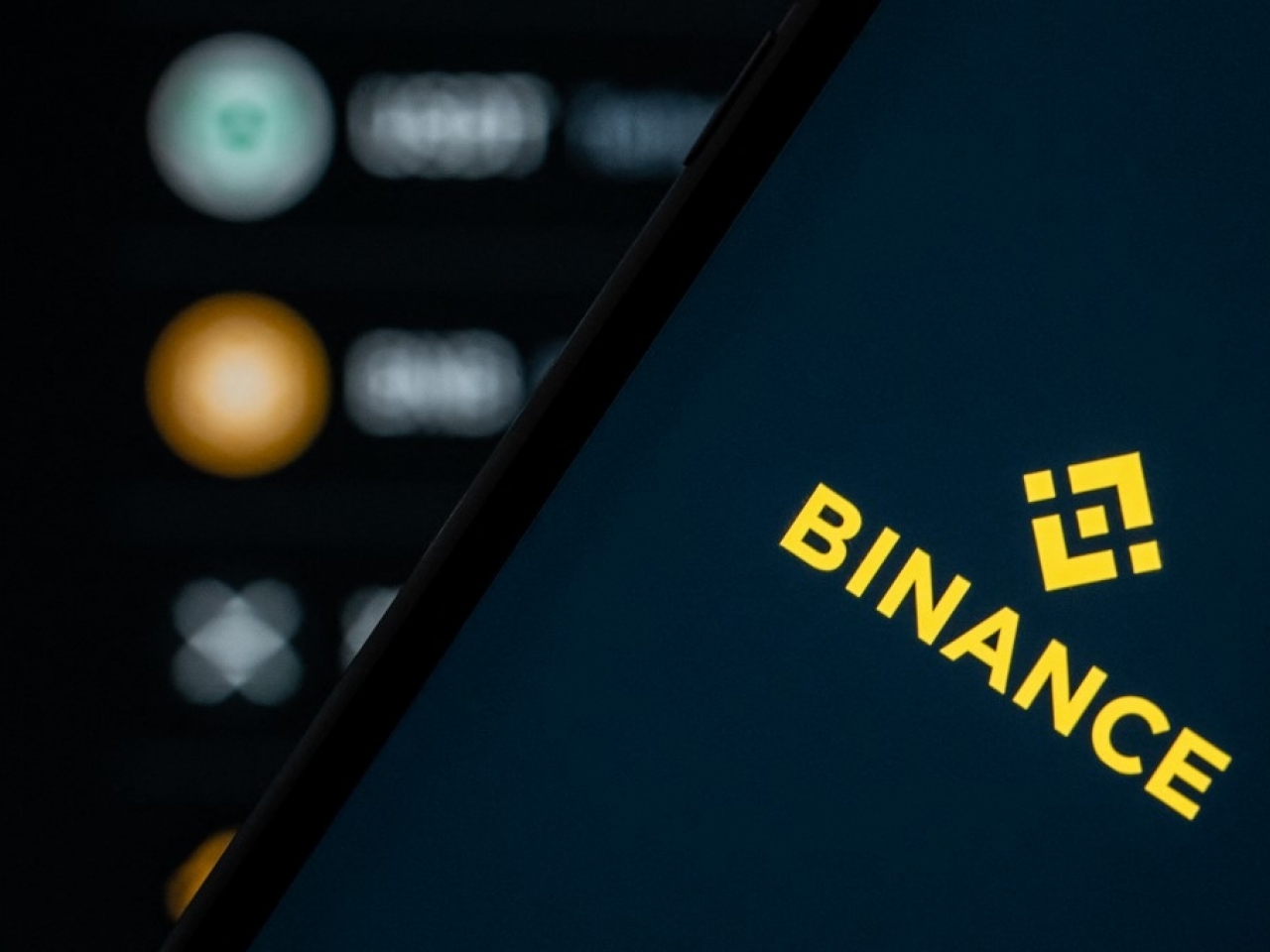Pain points, trends, and competition patterns-five questions and five answers to blockchain electronic invoices
Source: Keith Communication
Summary
- Facebook considers redesigning Libra for regulatory approval
- Xiao Lei: The United States urgently cuts interest rates to deal with the crisis, how to prevent ordinary people from being "cut leek"
- Grayscale Investment CEO: CBDC validates value proposition of digital currency
Second question: What are the pain points of electronic invoices solved by blockchain electronic invoices? 1) Go to hardware, cheaper. In July 2019, the State Administration of Taxation issued a Notice on Technical Specifications for Taxation UKey in order to further optimize the tax business environment and reduce the burden on taxpayers. UKey has lower cost than tax control equipment, and the cost does not need to be borne directly by taxpayers. Zhejiang, Gansu and other places have introduced related policies. We believe that the market has underestimated the government's efforts to reduce taxes and fees. The document issued by the State Administration of Taxation is an important signal to reduce the cost of electronic invoices. Blockchain electronic invoices do not require hardware, and the cost of invoicing is lower. Guangdong, Shenzhen, Fujian, Beijing and other places have launched pilot projects for blockchain electronic invoices. Method. 2) Invoicing on demand. According to Shenzhen's blockchain electronic invoice practice, the use of blockchain to issue electronic ordinary invoices can receive unlimited invoices based on business needs, without the need for approval and invoicing on demand. This is another distinctive feature of blockchain electronic invoices that are different from electronic invoices.
Three questions: What is the business model of blockchain electronic invoices? Blockchain electronic invoices are free of charge and rely on value-added services such as personalized development and financial management.
Question 4: How big is the market space for blockchain electronic invoices? In 2018, the aerospace information value-added tax anti-counterfeiting tax control system and related equipment revenue was 5.6 billion yuan, and its market share was about 70%, so the output value of this market was about 8 billion yuan. The current blockchain electronic invoice service providers are expected to receive revenue from the tax bureau and provide value-added services such as financial diversion and loan assistance after acquiring users.
Question 5: Which companies are doing blockchain electronic invoices? We recommend paying attention to the following targets: Donggang shares: 1) Channel advantages: deep financial and taxation, government, bank and other customer resources; 2) compliance advantages: all four blockchain businesses have been filed by the Cyberspace Office; 3) first-mover advantage : Layout of the blockchain business since 2017, leading in the industry; 4) The profitability of the main business is outstanding, the new business has strong learning ability, and it can copy the advanced experience of the main business to multiple fields (smart cards, file storage, etc.); 5) Governance institution advantage: The management holds a large proportion of shares, and the employee shareholding plan has completed the first phase. Jincai Interconnection: 1) The subsidiary Fangxin Technology has constructed a blockchain electronic invoice service platform that has obtained pilot qualifications in Guangzhou and Hepingtan; 2) reached a cooperation with Ant Blockchain and Alibaba Cloud, and consumers apply for invoicing through Alipay. Connect with the enterprise reimbursement system through software such as "nail nail" to open the whole process of "payment-invoicing-reimbursement" of the blockchain electronic invoice. Aerospace information: 1) Tax control equipment hardware provider with a large number of customers; 2) Earlier deployment in the blockchain field.
Risk reminder: The progress of blockchain technology development is not up to expectations, and the implementation of the blockchain business model is not up to expectations.
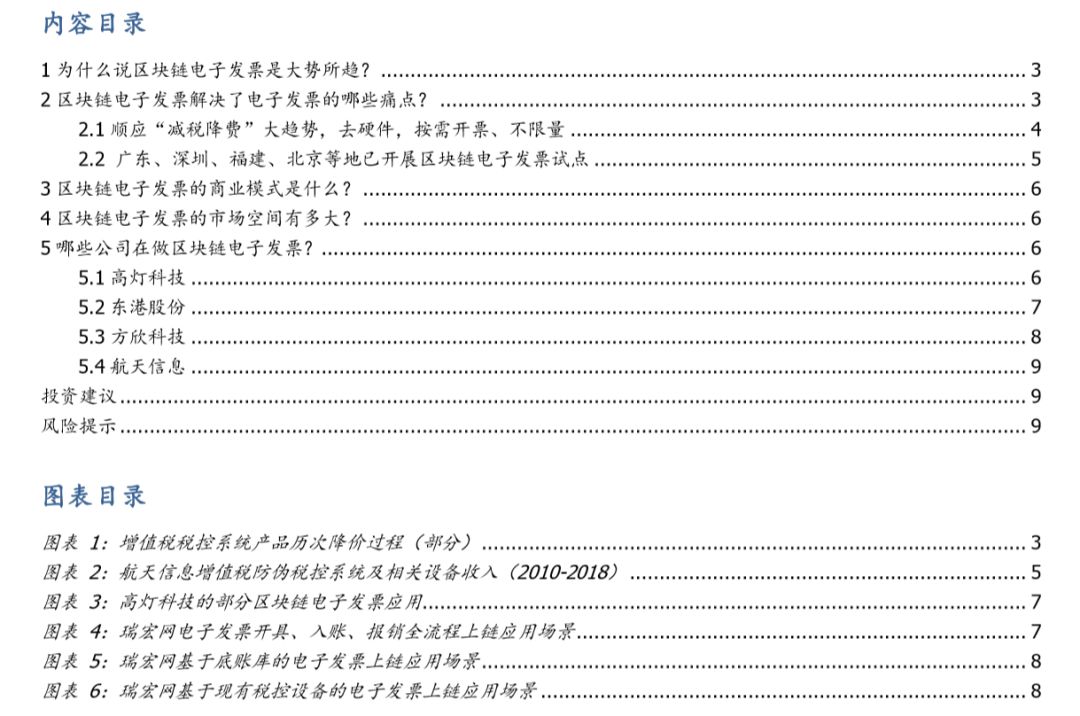
The central bank issued technical specifications for financial distributed ledger technology to accelerate industrial applications. In February 2020, the People's Bank of China released the Technical Specification for Financial Distributed Ledger Technology, and blockchain is a typical distributed ledger technology. The market believes that the meaning of blockchain is difficult to distinguish between authentic and false, which hinders industrial applications. We believe that blockchain technology is expected to accelerate under the premise of clear technical security specifications.
Comply with the national tax policy "reduction of taxes and fees". In 2016, the State Council's government work report proposed that a fiscal deficit of 2.18 trillion will be arranged, mainly to reduce taxes and fees. Since then, the government has repeatedly deployed relevant measures. This has also been reflected in the reduction of value-added tax equipment for at least three times. In February 2020, according to the decision of the executive meeting of the State Council, the Ministry of Finance and the State Administration of Taxation jointly issued a series of announcements to launch a "combination punch" on tax and fee reduction policies to help win the battle against epidemic prevention and control. Blockchain electronic invoices do not require hardware support, which can effectively reduce the billing costs of enterprises and consumers. As an important part of the country's "tax and fee reduction" deployment, it has become a general trend. Since 2018, Shenzhen, Guangdong, Fujian, and Beijing have successively launched pilot projects for blockchain electronic invoices. We expect that more municipal and municipal tax bureaus will follow up and launch pilot projects. Blockchain electronic invoices are expected to be "Liaoyuan."
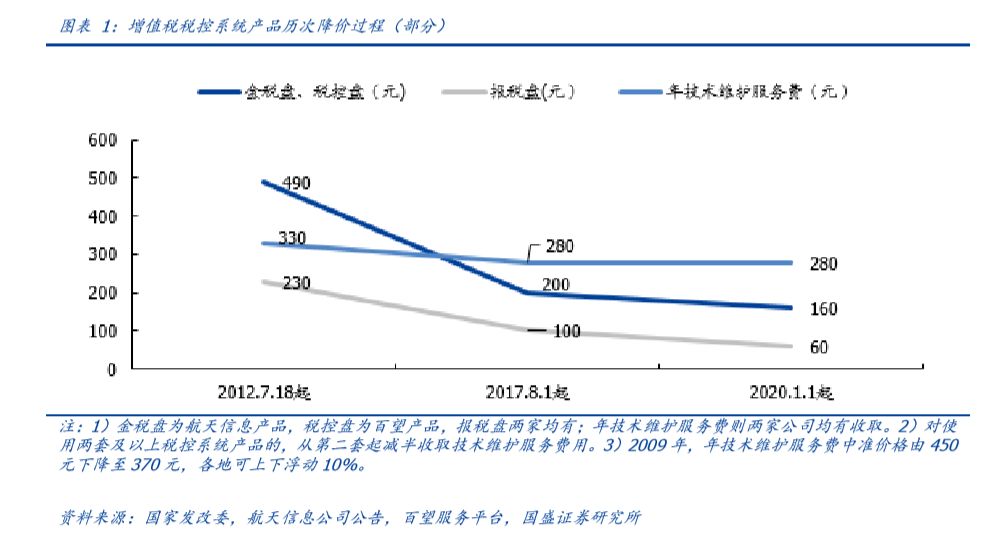
Under the epidemic, fiscal and tax informationization is expected to accelerate. In response to the need for epidemic prevention and control, the State Administration of Taxation has specifically proposed "contactless services", and local tax authorities have introduced a series of "contactless" tax payment services based on local conditions. The blockchain electronic invoice does not require ticket collection and purchase of special equipment, no ticket volume and limit restrictions, no natural contact, and there will be no "invoice shortage", which played an important role in the epidemic situation. In the future, financial and tax informationization is expected to accelerate further under the catalysis of the epidemic, which means that blockchain electronic invoices will also develop faster.
With the aid of blockchain technology's distributed multi-party consensus and asymmetric encryption mechanism, unlike traditional electronic invoices, blockchain electronic invoices are expected to achieve the following advantages: 1) non-tamperable, increasing the difficulty of forging and tampering with original invoices; 2 ) Trust transfer to reduce the cost of financial review and tax bureau audit of the reimbursement company; 3) Don't double spend to prevent multiple reports for one vote; 4) Data encryption and isolation, which helps privacy protection. Blockchain electronic invoices are expected to reduce the cost of electronic invoices for individuals, businesses, and governments: 1) for individuals, solving difficult reimbursement and cumbersome procedures; 2) for enterprises, reducing the cost of invoicing, archiving, and accounting; 3) For the government, reduce audit and supervision costs.
The Beijing Municipal Taxation Bureau's "Announcement on the Implementation of Blockchain Electronic Ordinary Invoices" mentioned that blockchain electronic invoices use blockchain distributed ledgers, smart contracts, consensus mechanisms, encryption algorithms and other technologies to ensure the issuance of electronic invoices. , Storage, transmission, anti-counterfeiting, and information security, with the characteristics of complete traceability of the entire process, information cannot be tampered with, etc. In a private chain or alliance chain manner, a new ecosystem of "trinity" of electronic invoices for tax authorities, bill issuers, and drawees has been established. The issuer realizes on-chain invoice application, issuance, inspection, and accounting; the acceptor implements on-chain storage, circulation, and reimbursement; the tax bureau's entire process supervision, and realize paperless intelligent tax management. The taxpayer does not need to go through the tax reporting process or purchase any special hardware equipment and professional equipment, and only needs to use a mobile phone or a computer connected to the Internet to issue the invoice. Technology updates, higher efficiency and lower costs.
In addition, although ordinary electronic invoices have realized the electronicization of invoices, they are still scattered among different electronic ticket suppliers, and there is a problem of data islands. The integration, verification, and tracking of these data is more complicated, causing a lot of cost waste. Various departments and enterprises are expected to use the blockchain technology to protect the organization's data information and achieve interconnection, establish an alliance chain, upload the invoice transfer information to the chain, and record electronic invoice information across regions and enterprises, making these information islands The data in the system is truly integrated, and the entire process of invoice status can be traced and traceable. At the same time, it also provides a transparent and secure distributed storage solution for all data in the chain. Moreover, these integrated data have the characteristics of high reliability, no or tampering, and strong verifiability.
2.1 Comply with the general trend of "reduction of taxes and fees", go to hardware, invoice on demand, unlimited
1) Go to hardware, cheaper
The blockchain electronic invoice follows the general trend of "reduction of taxes and fees." Assume that only the value-added tax market is discussed.In 2018, the aerospace information value-added tax anti-counterfeiting tax control system and related equipment revenue was 5.6 billion yuan . According to the 2017 half-year report of aerospace information, its anti-counterfeiting tax control market share is about 70%. The equipment and services provided by a large tax-controlled equipment service provider Baiwang Co., Ltd. are close to the price of aerospace information, and the market competition pattern is relatively stable. Based on this calculation, the market size is 8 billion yuan. The blockchain electronic invoice adopts a full-process on-chain model, without the participation of tax control equipment and hardware. The potential market space is wide and the social benefits are significant, which helps to reduce taxes and fees.
We noticed that in July 2019, in order to further optimize the tax business environment and reduce the taxpayer's burden, it issued a Notice on Taxation UKey Technical Specifications. Subsequently, according to the Circular of the State Administration of Taxation and the Zhejiang Provincial Taxation Bureau on Issues Related to the Implementation of the Public Service Platform for Electronic Value Added Tax Invoices, starting from November 10, 2019, monthly sales will not exceed 100,000 yuan (300,000 yuan per quarter, down The same) new small-scale VAT taxpayers who only need to issue ordinary VAT invoices (including paper invoices and electronic invoices) can voluntarily choose to receive tax UKey for free and issue ordinary VAT invoices through public service platforms.
On November 11, 2019, the first tax UKey was issued in Ouhai District, Wenzhou, Zhejiang . The background of this measure is that before the taxation department in the region communicated with Aerospace Information and Baiwang Jinfu, it launched a customized M / E disk for small-scale taxpayers who have not yet reached the collection point. Taxpayers who need to invoice themselves can apply for M for free. The / E disk issued an electronic value-added tax invoice, but the limitations of the M / E disk that cannot issue a paper version of the general VAT invoice resulted in a poor experience for some taxpayers. The newly issued tax UKey in Zhejiang enables enterprises and individuals who own it to apply for both electronic and paper versions of ordinary VAT invoices.
In our opinion, this move has changed the long-standing triangle relationship of taxation department-taxpayer-third-party service provider, and changed the competition of monopoly invoicing hardware (gold tax disk / tax control disk) by Aerospace Information and Baiwang Gold. The structure has been followed up by Gansu and other places on the background that the State Administration of Taxation has clarified relevant technical specifications. The blockchain electronic invoice helps to further reduce the billing cost and improve the billing efficiency.
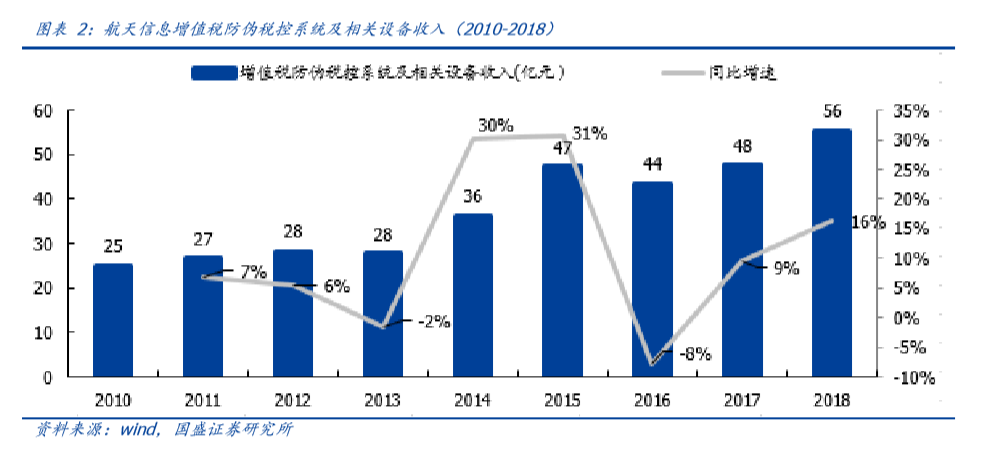
2) Invoicing on demand without approval
According to Shenzhen's blockchain electronic invoice practice, the use of blockchain for electronic ordinary invoices does not need to be obtained in advance, and can be issued directly in accordance with the standards of the tax bureau. This is another distinctive feature of blockchain electronic invoices that are different from electronic invoices. If other regions follow up, the cost of issuing blockchain electronic invoices will be further reduced than before.
2.2 Guangdong, Shenzhen, Fujian, Beijing and other places have launched pilot projects for blockchain electronic invoices
At present, tax bureaus in Guangdong, Shenzhen, Fujian and Beijing have launched pilot projects for blockchain electronic invoices.
In July 2018, Shenzhen received a reply from the State Administration of Taxation on the implementation of the blockchain electronic invoice application pilot work, and began the "blockchain + electronic invoice" promotion pilot work.
From January 1, 2020, Qianhai taxpayers in Shenzhen have fully used electronic invoices. At the same time, the implementation of blockchain electronic ordinary invoices in Shenzhen for more than a year has ushered in new progress: companies using blockchain electronic ordinary invoices. Unlimited invoices will be obtained according to the actual business, without the need for approval and ticket supply on demand.
In November 2018 and November 2019, the Guangdong Provincial Taxation Bureau and the Fujian Provincial Taxation Bureau successively issued the "Announcement on the Pilot Application of the" Tax Chain "Blockchain Electronic Invoice Platform to Issue General Invoices", and the "About the Pilot Application" Tickets "Chain" Announcement on Issuing General Invoices by Blockchain Electronic Invoicing Platforms "proposes the legal effects, basic uses, and basic use regulations of general invoices issued by blockchain electronic invoicing platforms based on" tax chains "and" ticket chains ". It is the same as the general invoice issued by other invoicing software approved by the tax department. In the future, blockchain electronic invoices are expected to be widely popular in various regions, and the application scenarios will become increasingly diverse. Its application value in the fields of taxation and finance is gradually becoming prominent.
In March 2020, the Beijing Municipal Taxation Bureau issued the "Announcement on the Implementation of Blockchain Electronic Ordinary Invoices" and decided to launch a pilot application of blockchain electronic ordinary invoices in Beijing. The document mentions that consumers can check and verify invoice information on the website of the Beijing Taxation Bureau or the authorized Ruihong website. At present, the pilot has selected some taxpayers' general parking invoices and attraction park tickets for promotion, and later included taxpayers from other industries in the pilot in due course.
1) Tax Ukey: According to the document issued by the State Administration of Taxation at the end of 2019, tax Ukey will be promoted to small-scale taxpayers. According to Aerospace Information's 2017 annual report, it had 10 million cumulative users in 2017. Assuming that they are general taxpayers, and knowing that Aerospace Information occupies 80% of the market, the total number of general taxpayers in the market is 12.5 million. According to the statistics of the State Administration for Industry and Commerce, as of September 2017, the total number of real enterprises in the country was about 29 million. The total number of small-scale taxpayers in the current period was about 16.5 million, that is, the ratio of general taxpayers to small-scale taxpayers was about 4 : 6. According to the average annual growth rate of 20%, the total number of small-scale taxpayers in 2020 is about 28.51 million, and the total number of real enterprises in the country is about 50.11 million. The cost of tax Ukey is 20 ~ 30 yuan / piece. Assuming the tax Ukey penetration rate reaches 50%, the output value of this part will be about 285 ~ 428 million yuan in 2020 for the small-scale taxpayer market. If it is promoted to all enterprises, the output value of the entire market About 501 to 752 million yuan. (If the aerospace information accumulated a large number of small and medium-sized taxpayers in 2017, it will have an impact on the estimation results.)
2) Third-party value-added services: With reference to Taiwan, electronic invoice value-added services account for 80% of the output value of the entire industry chain of electronic invoices. If the "blockchain + electronic invoice" develops smoothly, companies engaged in this business can obtain a large number of customers and develop value-added services based on this, the market space will be greater.
5.1 High Light Technology
High Light Technology was established in May 2017 by Tencent. It is a professional third-party tax-related service company specializing in the field of digitizing ticket tax. On August 10, 2018, under the leadership of the Shenzhen Municipal Taxation Bureau of the State Administration of Taxation, Tencent and High Light Technology issued the nation's first blockchain electronic invoice at the Shenzhen International Trade Revolving Restaurant, marking the country's first blockchain electronic invoice. Landed in Shenzhen.
After supporting the launch of the first electronic invoice issued on the blockchain in Shenzhen's catering industry, High Light Technology has extended its application scenarios to retail, subway and other scenarios. Its business processes include ticket collection, invoicing, circulation, acceptance, accounting There are four steps: 1) the tax authority writes the invoicing rules on the tax chain, puts the restrictions on invoicing, real-time approval, and controls invoicing; 2) the invoicing enterprise applies for an invoice on the chain and writes it Transaction order information and identification; 3) The taxpayer claims the invoice on the chain and updates the taxpayer's identity on the chain; 4) The invoice-receiving company checks the invoice, locks the invoice status on the chain, audits the account, updates the invoice status on the chain, and finally Pay reimbursement. This solution does not involve the hardware of tax control equipment in traditional electronic invoices. This solution is backed by Tencent's massive C-end traffic, payment services and government public relations experience, and is a pioneer in the field of blockchain electronic invoices.
As of October 27, 2019, there were more than 7,500 companies registered in Shenzhen to use blockchain electronic invoices, with a total of 9.75 million invoices involving 6.93 billion yuan. Blockchain electronic invoices are widely used in Shenzhen financial insurance, retail supermarket, hotel catering, parking services, Internet services, property services, transportation and other industries.

5.2 Donggang Shares
Donggang Co., Ltd. has an early layout in the field of blockchain electronic invoices. In July 2017, Donggang Co., Ltd. and Wangwang Branch reached a strategic partnership on blockchain to jointly build a blockchain cloud platform based on electronic invoices. In January 2018, it signed a strategic cooperation agreement with Jingtong Technology, the first domestic company engaged in the underlying technology of the blockchain, and announced the establishment of a blockchain research laboratory to build an ecosystem of electronic invoices and electronic bills based on blockchain technology. In September 2018, a partnership framework agreement was signed with Ant Blockchain, which includes research and development and implementation of an electronic blockchain invoice that can be reimbursed, and queries, checks authenticity and traceability on Alipay and Ruihong platforms. In October 2019, the four blockchain service projects of the subsidiary Donggang Jiahua completed the filing of blockchain information services, including the electronic invoice blockchain.
As a subsidiary of Donggang, Donggang Ruihong focuses on the development of electronic invoices. There are three application methods of Ruihong.com's blockchain-based electronic invoices: 1) the entire process of invoice application, invoicing, payment, and reimbursement; 2) chaining based on the electronic tax account database of the State Administration of Taxation; uploading invoices to The electronic tax ledger of the State Administration of Taxation is put on the chain, and functions such as reimbursement and tax reporting are developed through on-chain smart contracts. The implementation cycle is half a month; 3) On-chain based on existing tax control equipment; tax control equipment is invoiced through a third party The service platform can be chained, which can be real-time chained and checked. The implementation period is 2 months.

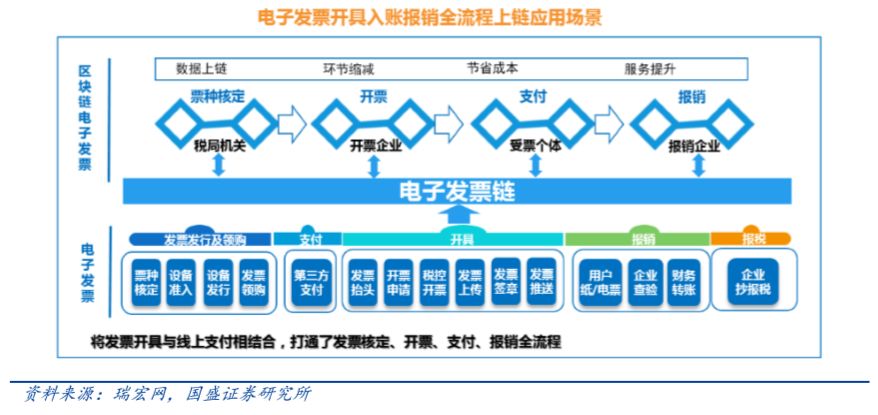
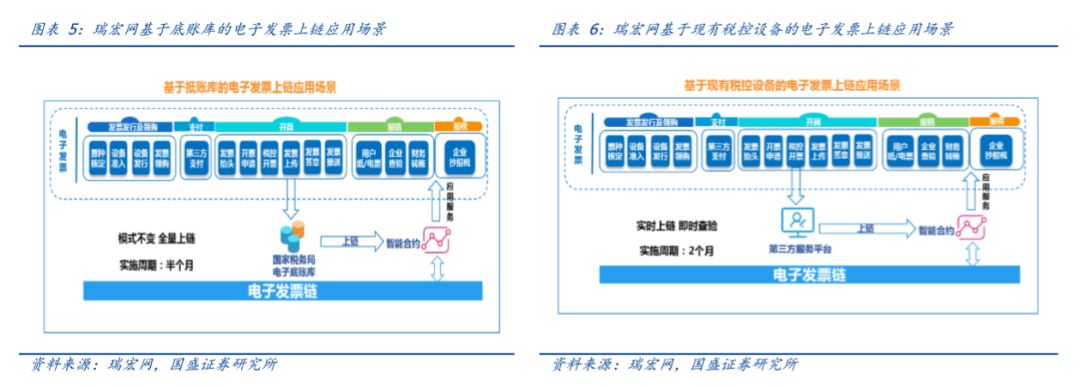
Donggang issued the first electronic invoice in China in 2013, but due to the impact of hardware, the development of electronic invoices was slower than expected. Until 2018, the company made progress in the blockchain field. Now it is “blockchain + electronic invoices” The technology is relatively mature, and it has broken away from the limitation of no hardware production capacity. Dehardization provides better market space for Donggang, which is conducive to the development of a large number of customers, and it will help to provide personalized development services for it in the later period. Ruihong.com, the company's subsidiary, has become the only unofficial inspection platform for the Beijing blockchain electronic invoice trial, and the company's business is expected to blossom across the country.
5.3 Fangxin Technology
Fangxin Technology is a wholly-owned subsidiary of Jincai Interconnect. Founded in 1998, it is the implementer of the company's blockchain electronic invoice business. At present, only Shenzhen and Guangzhou Hepingtan have launched blockchain electronic invoice business. Among them, Fangxin Technology is the Guangzhou blockchain electronic invoice platform “tax chain” and Hepingtan blockchain electronic invoice platform “ticket chain”. Platform contractor.
In June 2018, the "Tax Chain" platform was launched in Guangzhou as the nation's first blockchain electronic invoice platform, and Fang Xin Technology provided its technology provider. In December 2018, the Guangdong Provincial Taxation Bureau joined Fangxin Technology, Ant Blockchain, and Alibaba Cloud to upgrade the platform. Consumers applied for invoicing through Alipay and docked with the enterprise reimbursement system through software such as "nail nailing" to open up the block. Chain electronic invoice "payment-invoicing-reimbursement" process, this pilot selected several companies in the catering, parking, tourist attractions and other industries. At the beginning of November 2019, the "ticket chain" was officially launched, and the first blockchain electronic invoice in Fujian was issued.
5.4 Aerospace Information
Aerospace Information began to study blockchain technology in 2016, exploring typical applications, and preparing for the large-scale application of blockchain technology. After two years of continuous tracking and research and development, Aerospace Information has developed a blockchain technology development platform, a basic development platform for enterprise-level applications with independent intellectual property rights.
Among them, electronic invoice is the main application of aerospace information blockchain technology. In July 2018, Aerospace Information released a blockchain electronic invoice system. In order to solve the pain points of electronic invoice sharing, circulation, collection, and inspection, the aerospace information chooses the alliance chain method for the construction of electronic invoice blockchain circulation and integration application platform, so that invoice circulation and application related services can be established in the block Finish in the chain. As of September 2018, the platform has been piloted in five regions of Hubei, Shandong, Beijing, Inner Mongolia and Ningxia, and progress is good. In December 2019, the system was selected as the fourth batch of cyber security technology pilot projects by the Ministry of Industry and Information Technology.
Donggang shares: 1) Channel advantages: deep financial and taxation, government, bank and other customer resources; 2) Compliance advantages: All four blockchain businesses have been filed by the Cyberspace Office; 3) First-mover advantages: Layout area since 2017 Blockchain business, leading in the industry; 4) The profitability of the main business is outstanding, and the new business has strong learning ability, which can copy the advanced experience of the main business to multiple fields (smart cards, file storage, etc.); 5) Advantages of governance institutions: large management Proportionate shareholding, the employee shareholding plan has completed the first phase.
Jincai Interconnection: 1) The subsidiary Fangxin Technology has constructed a blockchain electronic invoice service platform that has obtained pilot qualifications in Guangzhou and Hepingtan; 2) reached a cooperation with Ant Blockchain and Alibaba Cloud, and consumers apply for invoicing through Alipay. Connect with the enterprise reimbursement system through software such as "nail nail" to open the whole process of "payment-invoicing-reimbursement" of the blockchain electronic invoice.
Aerospace information: 1) Tax control equipment hardware provider with a large number of customers; 2) Earlier deployment in the blockchain field.
The development of blockchain infrastructure failed to meet expectations. Blockchain is the core technology for solving supply chain finance and digital identity. At present, the blockchain infrastructure cannot support high-performance network deployment. The degree of decentralization and security will have a certain restriction on high performance. The blockchain infrastructure exists The risk of developing less than expected.
We will continue to update Blocking; if you have any questions or suggestions, please contact us!
Was this article helpful?
93 out of 132 found this helpful
Related articles
- Case study: How to create a synthetic trading pair?
- Bitcoin's privacy dilemma: can it be 100% anonymous?
- Opinion | Members of the Korean Financial Services Commission: Lack of actual use is the biggest obstacle to the development of cryptocurrencies
- Sun Yuchen used capital hegemony to control Steem, causing controversy, the integrity of stolen users' voting rights was questioned
- Google Play delisted the app many times to provoke public outrage. When can decentralization lead the future?
- Money, commodities, or securities? What is Bitcoin? This issue will have a significant impact on the future of cryptocurrencies
- Free and Easy Weekly Review | The strongest shield of privacy is threatened, how can the blockchain resist side channel attacks?



